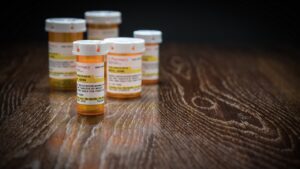Vitamin B6 calms the nervous system, helps the body to produce neurotransmitters and so balance the neurotransmitter systems transmitting messages through it. No wonder then that numerous studies have connected this vitamin with ADD (Attention Deficit Disorder) and ADHD (Attention Deficit Hyperactivity Disorder).
ADD/ADHD is generally considered a neurological disorder where a person is easily distracted, unable to focus on a specific task, daydream in ADD and fidget and feel restless in ADHD.
Saying something is a neurological disorder is not helpful unless one also says, what has caused this neurological problem. Treating symptoms, but not whatever it is that causes the symptoms is not a cure, but an excuse to sell medicine.
ADHD medication calms children according to one view, but dampens their spark and makes them compliant according to the alternative view, by describing the same effect from different viewpoints. If ADD/ADHD people have a deficiency in the neurotransmitter dopamine, then the logical question a doctor should ask is: “Why?”
The cause of the deficiency should be addressed as naturally as possible and not artificially boosted for a few hours with potent synthetic drugs. If ADHD is caused by a dopamine deficiency, get the body to produce the dopamine by itself. ADHD is not a Ritalin deficiency. ADHD is a complex set of conditions that are still not well understood, but share a common set of symptoms. The individual’s metabolism of vitamins and minerals is one link in this story. One study found that vitamin B6 was as or a little more effective than methylphenidate, one of the stimulant drugs used to treat ADHD. The products containing methylphenidate are Ritalin, Concerta, Focalin, and the Daytrana patch.
People who are hyperactive and/or have attention deficit have a different metabolism than the majority of the population and therefore need supplements to help compensate for this deficit. It is not so much a disorder, but more like being different. The link between metabolism and ADHD has largely been ignored in research, but the fact remains that with the right amount of magnesium and B6 in the body, people with ADHD can think clearer and concentrate better.
Children with ADHD (that’s the age group mostly studied) generally have lower vitamin B6 and magnesium levels than the average child. These two nutrients are linked, and for best effect, with ADD/ADHD both should be taken. Taking these two supplements eases hyperactive behavior and increases focus and attention, being able to think clearer and concentrate better.
ADHD medication as directed on the dopamine neurotransmitter system as a lack of dopamine causes ADHD-like symptoms. Vitamin B6 is needed for the formation of dopamine. If there is a vitamin B6 deficiency, then the body’s dopamine production suffers. ADHD stimulant drugs will mask this deficiency artificially, while a vitamin B6 supplement will help the brain produce dopamine naturally.
Dopamine is formed when the enzymes in the brain react with L-DOPA, but this process is first activated by a co-enzyme, which is vitamin B6.
For ADD and ADHD, magnesium should be taken together with vitamin B-6. This vitamin improves the absorption of minerals including magnesium into cells. Zinc is also usually low in attention deficit and hyperactive people, and a supplement like the product ZMA from NOW is ideal as it contains these elements and vitamins in the right proportions for ADHD and is designed to maximize absorption. It is a synergistic combination of zinc and magnesium with vitamin B6 without sugar, yeast, gluten, soy, milk, egg, shellfish, or preservatives. For treating ADD and ADHD the recommended doses vary but is in the region of:
Magnesium: 3 mg to 6 mg per pound bodyweight and day.
Vitamin B-6: 0.3 mg per pound bodyweight and day.
>>>>> Get magnesium and B6 from NOW <<<<<
You can experiment, starting with these dosages, as your need is very individual depending on your metabolism. There is no risk of overdosing on vitamin B6 at this level of dosage in healthy people. (See !!! NOTE below on magnesium overdosage.)
If you do get a benefit from this, then you need to keep taking this supplement. I do and I treat my B6-magnesium supplements as food. We all have our personal metabolism, that is why there is no universal weight loss diet, in spite of what the adverts try to make us believe.
Vitamin B6 plays an essential role for normal brain development and is essential in the synthesis of brain chemicals, converting amino acids into neurotransmitters in the brain. It also is necessary keep a healthy balance between the neurotransmitter systems. Vitamin B6 helps to produce: acetylcholine, dopamine, gamma-aminobutyric acid (GABA), norepinephrine and serotonin as well as and the allergy regulator histamine. This vitamin is also an important antioxidant.
!!! NOTE on magnesium overdosage:
For most healthy people large doses of magnesium appear safe, so magnesium from food and a reasonable addition of supplement will not lead to an overdose. The first sign of taking too much magnesium is the laxative effect. Many laxative products contain magnesium compounds for this effect.
Stimulant medication taken for ADHD increases the absorption of magnesium, therefore if you do take this medication be aware of this effect.
A deficiency in magnesium is less pleasant, it results in nausea, fatigue, muscle weakness, irritability, depression, loss of appetite, cramps, abnormal heart rhythm, and in women an increased premenstrual stress.
!!! NOTE If you have kidney problems: You should not take magnesium supplements. Your doctor should prescribe medication to counter magnesium deficiency. Although people with kidney disorders may have low magnesium levels, they risk complications from a high magnesium intake and should use medication instead of supplements.



